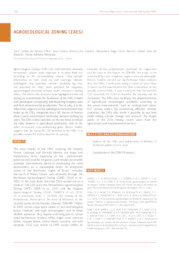Agroecological zonings (ZAEs).
Agroecological zonings (ZAEs).
Author(s): ARAUJO FILHO, J. C. de; SANTOS, J. C. P. dos; BARROS, A. H. C.; AMARAL, A. J. do; MARQUES, F. A.
Summary: Agroecological Zonings (ZAEs) are multi-thematic planning instruments whose main objective is to plan land use according to the sustainability criteria. They include information on soils, land use and coverage, climate, pedological crop potential, climate suitability by crop, soil potential for crops, land potential for irrigation, agroecological potential of land, water resources, among others. The theme that deserves to be highlighted is the soil survey, as it constitutes the "backbone" of the ZAEs. It deals with pedological cartography individualizing mapping units and their environmental peculiarities. That is why, it is the theme that supports all the pedological interpretations that make up the ZAEs. Integrated into a GIS, the set of themes allows quick consultations facilitating decision making by users. The ZAEs make it possible, on the one hand, to reduce the risks inherent in agricultural production, and on the other, to increase crop productivity gains. Recent studies suggest that for every R$ 1.00 invested in the ZAEs, it is possible recover R$ 12.60 in benefits for society.
Publication year: 2021
Types of publication: Book sections
Unit: Embrapa Soils
Keywords: Zoneamento agroecológico, Zoning
Observation
Some of Embrapa's publications are published as ePub files. To read them, use or download one of the following free software options to your computer or mobile device. Android: Google Play Books; IOS: iBooks; Windows and Linux: Calibre.
Access other publications
Access the Agricultural Research Database (BDPA) to consult Embrapa's full library collection and records.
Visit Embrapa Bookstore to purchase books and other publications sold by Embrapa.

